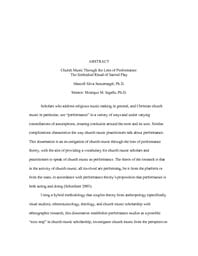 Subjects: Church music. Performance. Performance studies. Embodiment. Ritual. Liturgy. Music.
Subjects: Church music. Performance. Performance studies. Embodiment. Ritual. Liturgy. Music.
Abstract: Scholars who address religious music making in general, and Christian church music in particular, use “performance” in a variety of ways and under varying constellations of assumptions, creating confusion around the term and its uses. Similar complications characterize the way church music practitioners talk about performance. This dissertation is an investigation of church music through the lens of performance theory, with the aim of providing a vocabulary for church music scholars and practitioners to speak of church music as performance. The thesis of the research is that in the activity of church music, all involved are performing, be it from the platform or from the seats, in accordance with performance theory’s proposition that performance is both acting and doing (Schechner 2003). Using a hybrid methodology that couples theory from anthropology (specifically ritual studies), ethnomusicology, theology, and church music scholarship with ethnographic research, this dissertation establishes performance studies as a possible “next step” in church music scholarship, investigates church music from the perspectives of ritual, embodiment, and processes of making special, play and change. It also demonstrates the feasibility of studying church music as performance using the vocabulary developed in the dissertation. By providing a performance language for the study of church music, this dissertation contributes to scholarship and furthers interdisciplinary investigations of religious music making in context.
Link to Document: Online Access available via BEARdocs
